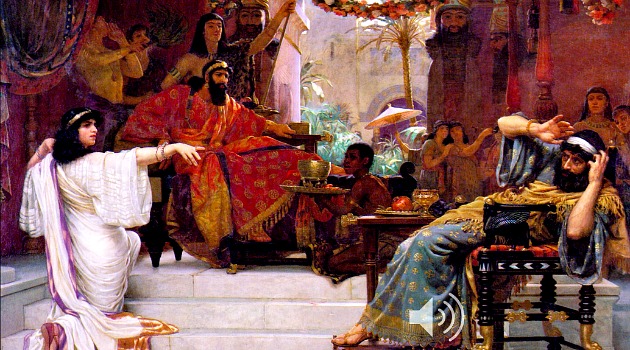Purim Recalls Judaism's Genocidal Agenda
March 11, 2017






Direct Link to Latest News
March 11, 2017






Brendon O'Connell said (March 12, 2017):
I hope Iran invites Michael Hoffman to speak Henry.
It took me three weeks of screaming to get permission to work with "The Persian Gulf Studies Center" to organize a conference in Tehran on Israeli spying. Why did I have to scream for three weeks and to get that happening? What do you think?
To talk about Purim and the underlying racial and religious supremcism in Jewish holy books? Iran would not even touch it.
Which makes me wonder about who is ultimately controlling Iran?
Henry, somewhere above the heads of even Netanyahu and Rohani themselves is an organization playing a very clever game. It runs along the lines of NATO - DRUG DEALING - ARMS TRADING - SWISS AND GERMAN BANKS...
Something that runs above Christian, Jew, Muslim, Communist - one "thing" to rule them all.
His name is Albert Pike.
Thanks for pointing this out Henry. Very important. I assure you in the northern suburbs of Iran no one cares about Purim and the meaning. They are just planning on their next drinking party. They may care about it but in the poorer places, they dont know about it. In the Shia Mosques they dont talk about it but they remember the past sacrifices of Ali and Hossein. I urge people to forget about Iran and put them in the waste paper basket of history. They are dreaming of a Shia Iranian Persian Empire and giving Israel and the US proxy army it controls the excuse it needs to send troops in to contain Shia expansion in the Middle East - and a reason for the Sunni states to grow closer to Israel and the US.
I heard government people attached to the Persian Gulf Studies Center speak casually about regaining "all the Stans" back after the British empire artificially broke them apart. All well and good, but it aint going to happen. They are delusional.
Javier from Spain said (March 12, 2017):
Nobody sees in the Purim cookies a representation of the female pubis?. The protagonist in the story is the woman, Esther, who points to those who can hinder the agenda in action, acting through her power (reflected in the biscuit) to denounce them, corral them and annul them.
Does it sound like nothing in today's world?
Dan said (March 12, 2017):
For those who know this old fable, you'll understand why Putin isn't flattered to be offered the role of a modern King Assuerus. He is portrayed as a weak minded, pussy whipped fop who is easily flattered and stays drunk a lot.
My first reading of the Book of Esther was in late middle age, because my parents raised me in a Presbyterian church and the King James Bible doesn't include Esther. It's one of the books Martin Luther and Calvin dropped from the Canon. Reading it as an adult, I found myself wishing it had deeper character development. I was curious to know the details of what Haman thought the Jews were up to that was so dangerous to the kingdom that Haman thought they needed to be wiped out.
The story seems designed to create mythic straw man to represent anti-Semitism into which Jews could plug any real historical character later on: King Edward 1st, Grand Inquisitor Tomas Torquemada, or Hitler can easily labeled as "another Haman".
Putin was very smart to suggest not mixing old narratives with current events.
Ron D said (March 23, 2016):
Purim is a lie. The book of Ester is easily proven to be a lie as it has no references in the historical records. However, the book of Daniel who Jesus mentions in the New Testiment is a book of truth. In the book of Ester it says that Haman was the chief steward of Nebuchadnezzar but no reference in the historical record supports this. However, Daniel who was made the chief steward does have references in antiquity.
At the council of Trent when the bible was being canonized, their were great debates as to whether or not the book of Ester should be added to the bible as we know it. Many texts were rejected because they lacked factual references which could be traced back. The reason why Ester was added was due to 5 hidden rubrics which clearly had the sacred name of GOD / YHVH included in the book of Ester. What is interesting is that in some of these instances the name of GOD / YHVH are written in reverse. This is a Satanic thing to write the name of GOD backwards. But I believe it is symbolic to those who would call themselves Jews and whose true lineage are Ashkenazim / Turkic and have no Semitic Blood / DNA. Jesus warned us about them in Rev 2:9, 3:9.
Bottom line.. Ester like the Ashkenazim today masquerade as Jews and are so filled with hate because their Babylonian traditions clearly state they are gods and we are their chattel / slaves.
Thomas said (March 23, 2016):
I concluded that the reason for including the book of Esther in the Bible is to warn Christians to beware of Jews. In 2014 I wrote a commentary on Esther.
My concluding remarks are at http://tcallenco.blogspot.com/2014/08/esther-part-5.html.
The first four parts can be accessed from June and July 2014 on the right side of the page.
Henry Makow received his Ph.D. in English Literature from the University of Toronto in 1982. He welcomes your comments at
James C said (March 12, 2017):
Concerning Purim and its application today by Talmudic Jews to anti-Semites, this is just another example of what I have come to term as cafeteria style biblical exegesis. As far as I can tell, the Jews and the vast majority of Christian denominations are guilty of this method of exegesis; they go through the bible and they pick and choose what they want to believe. They ignore the historical and cultural context of whatever passage is under consideration so they can apply the passage to today's world. Thus they lift the passage out of its historical and cultural setting and interpret it in an exegetical vacuum. You cannot correctly interpret the bible by using this method of exegesis. It is an exegetical fallacy. The book of Esther describes events that occurred in 483-473 B.C. If the truth were ever told (and I seriously doubt that it ever will be), those events have no historical or cultural parallels with today's world. The book of Esther does not "recall Judaism's genocidal agenda." It's an historical record of the thwarting of Haman's attempted genocide of the Jews. Any other interpretation of the book is an example of eisegesis, an interpretation that expresses the interpreter's own ideas, bias, or the like, rather than the meaning of the text.